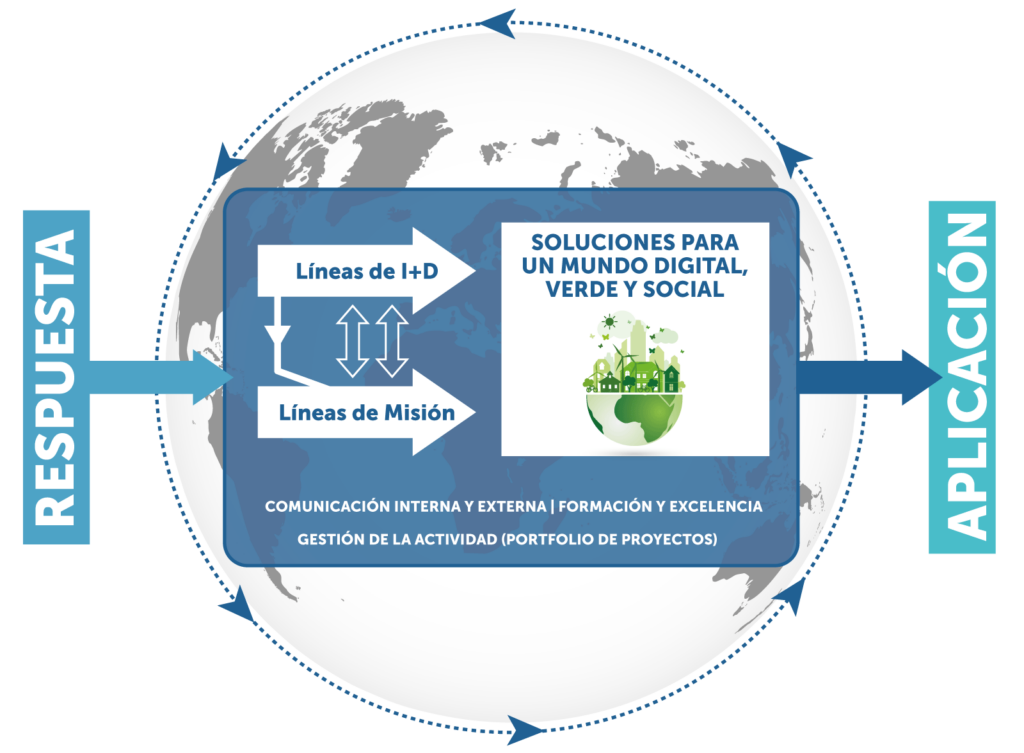

The current Scientific and Technological Plan represents the working framework for research and development research and development for the period 2021-2024 . In this case, the approach builds on the good results obtained with the previous plan (2017-2020), which was built from a technological vision of the backbone the institute, and is moving forward with the aim of applying the technologies developed towards the resolution of specific missions that respond to the challenges of reality digital, green and social around us.

Thus, the technology developed at the institute is applied in sectoral solutions to achieve four objectives/missions:
In order to meet these four objectives, eleven lines of R&D have been identified. eleven R&D lines that help us to create technological solutions oriented to products, processes or services, providing excellent scientific-technological knowledge with high added value.
This structure allows the realization of multidisciplinary projects for the development of complex systems including the design, development and production of the materials and physical structure of the system, its sensing, actuation, software, communications and intelligence systems.
The development of the activity planned along these lines promotes internal communication, thus ensuring the search for synergies and the development of synergies and the ability to create cross-cutting solutions .
Application of bio-based and recycled materials to industry by adapting the final properties to the end-use requirements of the products, including lifetime and recyclability and/or biodegradability conditions. The focus during this WP will be on the application of circularity to materials as well as on the basic knowledge of degradation processes and their control without loss of properties.
Development of numerical-experimental tools and strategies to accelerate the scale-up and industrialization of waste valorization and material recycling processes. Application to unit operations of solids and fluids as well as to thermochemical, electrochemical and biological processes. The emphasis in the short term will be on the implementation of a collaborative laboratory to provide companies with technologies that allow them to convert/develop climate-neutral processes.
Develop and apply tools and techniques to virtually understand and predict the relationships between the process, structure, properties and function of materials. The current focus is to contribute to the design of advanced climate-neutral materials, faster and at a fraction of the cost.
Integration of digital prototyping techniques and experimental methods to predict the functional behavior and service life of components and systems to improve the final performance of products and extend their service life. The focus during the TP will be to contribute to the competitiveness of the productive sector and environmental sustainability by making efficient use of materials and energy.
Methodologies and tools based on modeling and simulation, and their application to the design, verification and complete life cycle of products, processes and complex multidisciplinary systems (electronics, software, mechanics, …). The focus is on reducing time and costs, while increasing efficiency, safety, reliability and functionality and reducing environmental, economic and social impact.
Development of new technologies with high electronic density, low consumption, based on energy storage systems and renewable energies. The focus during these years is on optimizing energy resources in a sustainable manner to achieve an environmentally friendly energy growth model.
Development of multi-sector solutions, with learning capabilities and knowledge extraction from data, texts and videos, on platforms, scalable and in real time. The focus over the next few years will be on artificial intelligence.
Digital technologies to improve efficiency in operations management and process optimization . It is oriented to industrial processes, logistics processes and supply chain. The activity is focused on increasing knowledge, integration and extension towards the digital twin concept and its potential application in mobility, energy management, agro-industry and healthcare.
Promote, through R&D&I activities, the sustainability of materials transformation processes (existing processes and transformation of new emerging materials). The focus is on improving productivity and quality, reducing waste and energy consumption, moving towards digitization of factories and disruptive technologies such as additive manufacturing.
Technological solutions for the design, development and implementation of innovative materials incorporating new/multiple functionalities and ‘smart’ features. The focus during this WP will be on materials capable of responding in a controlled manner to certain stimuli (deformation, magnetic fields, temperature…), self-sensing and/or self-repairing materials, materials with functional gradation and/or offering improvements in certain specific properties, advanced adhesive bonds and surface texturing and coatings.
Design and development of robust and safe robotic systems capable of moving and interacting with their environment using intelligent on-board perception systems, advanced sensory fusion and navigation techniques. In this PT we focus on the development of collaborative multi-robot and hybrid co-simulation systems applied to industry, environment and people.